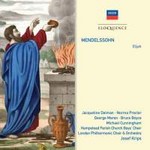
Mendelssohn: Elijah, Op. 70 (complete oratorio recorded in 1954)
 $25.00
Out of Stock
$25.00
Out of Stockadd to cart
FELIX MENDELSSOHN
Mendelssohn: Elijah, Op. 70 (complete oratorio recorded in 1954)
Jacqueline Delman, Norma Procter, George Maran / London Philharmonic Orchestra & Choir & Hampstead Parish Church Boys' Choir, Josef Krips
[ Decca SBS Australian Eloquence / 2 CD ]
Release Date: Tuesday 1 March 2011
"Boyce sings the part with studied beauty, as indeed do all the other soloists, and the chorus is in excellent form. Josef Krips sets them some rapid tempi here and there, but the result is lively and interesting … plenty of orchestral detail even in the loud choruses … Norma Procter's singing is always beautiful"
(Gramophone)
Born in Vienna in April 1902, the cheery-looking Josef Krips seems to have been pre-destined to achieve eminence in the Viennese classics. He recorded with both, the Wiener Philharmoniker and the key London orchestras for Decca in the 1940s, 50s and 60s and the interpretations have genuine expressive power while remaining devoid of exaggeration or affectation.
Mendelssohn's Elijah was premiered to great acclaim and was perhaps the greatest triumph of his lifetime performances of the oratorio were attended by, among others, Queen Victoria and Prince Albert. It became second in popularity to Handel's Messiah in English-speaking lands and elsewhere held its own in the choral repertoire. In the character of Elijah, Mendelssohn created a musical personality as comprehensive as any in 19th-century opera. The oratorio as a whole encompasses lofty choral outbursts, heartfelt sentiment, profundity and even humour. This recording, made at the end of the mono era in 1954, was, for long, a benchmark for this work and at long last receives its first CD release on Decca.
The notes for this issue are by Tully Potter and it forms part of a series of five reissues devoted to the art of Josef Krips.
Recording producer: James Walker
Recording location: Kingsway Hall, London, UK, September 1954
![Schubert: Symphony No. 9 in C major, D944 'The Great' (with Beethoven - Symphony No 4) [recorded 1953-54] cover](https://images.marbecks.co.nz/_thumbnails/10179/10179791.jpg)

